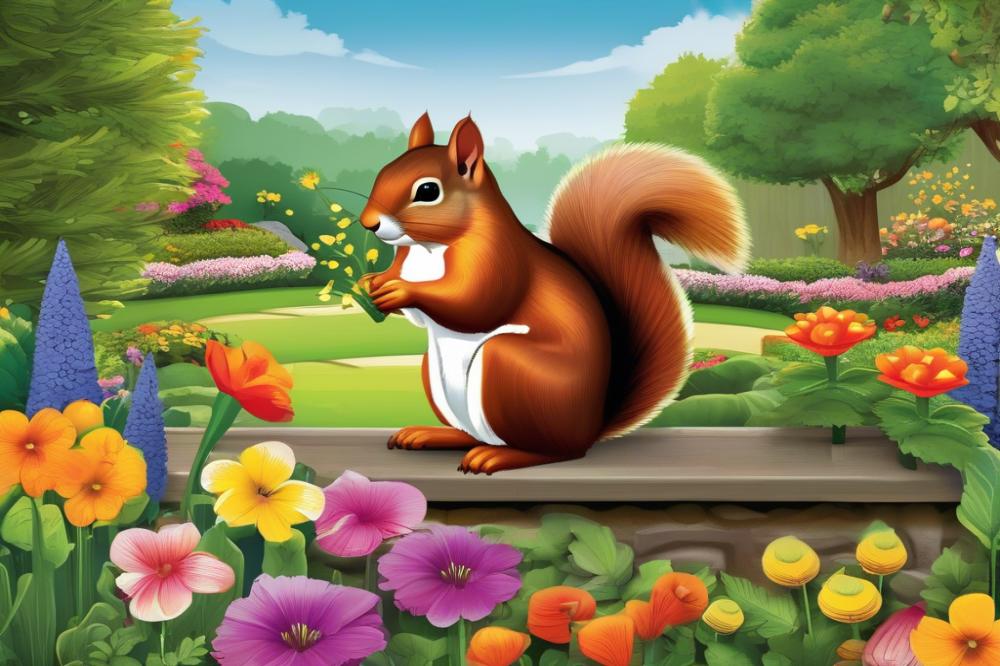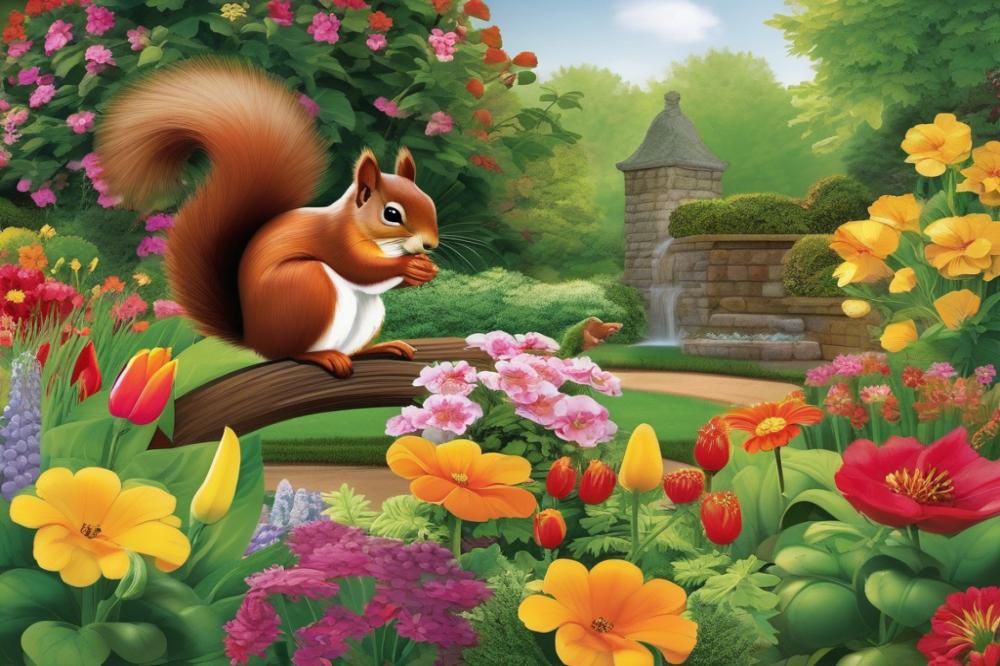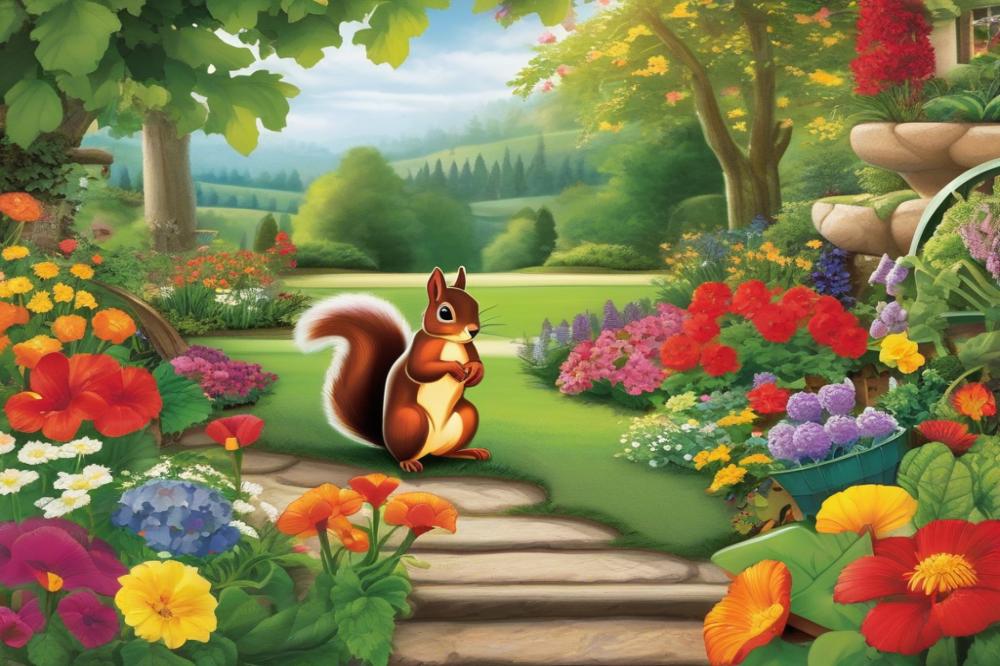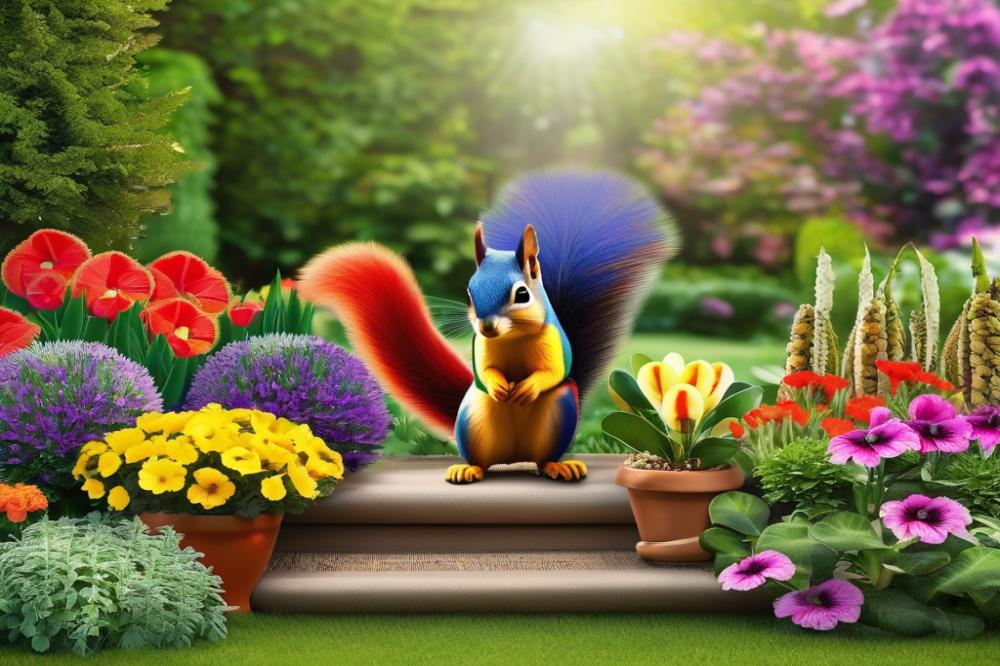Introduction
Squirrels are often seen as cute and playful creatures, but they can quickly become a nuisance in our yards. These small animals may dig up plants, devour vegetables, and steal seeds. Their curious nature leads them to explore gardens, which can create chaos for gardeners trying to nurture their plants. When squirrels invade, it transforms the peaceful garden space into a battleground for survival.
Protecting your garden from squirrels is important for maintaining a healthy, vibrant outdoor environment. Not only can these pests damage your beloved flowers and vegetables, but they can also disrupt the balance of your ecosystem. Taking action to prevent squirrel intrusions ensures that your hard work does not go to waste. Fortunately, there are many effective strategies available for dealing with these persistent creatures.
This article will discuss various methods to keep your garden safe. You will learn about different squirrel repellents and explore effective fencing options. We will also cover subjects like plant choices that deter squirrels, natural remedies, and practical DIY solutions. Noise and scent deterrents can be useful, so those will be included as well. Techniques like companion planting and leveraging ultrasonic devices will also be addressed. With the right approach, you can effectively protect garden squirrels and maintain the beauty of your green space.
protect garden squirrels: Understanding the Threat


Squirrels can be quite the nuisance in gardens. Known for their acrobatic skills, they use trees and fences to access plants with ease. Their playful nature can mask a more destructive side when it comes to garden care. For instance, activities like digging and gnawing often lead to damaged roots and stems.
Commonly targeted plants include vegetables like tomatoes, peppers, and leafy greens. Squirrels are also fond of seeds and bulbs. Flowers, especially those with tender blossoms, can become victims of their curiosity. They are particularly attracted to ripe fruit, which makes backyard orchards another prime target.
The impact of squirrel activity can be significant. A garden that suffers from their mischief may not only lose valuable crops but also present an untidy appearance. Excessive digging can create unsightly holes and disrupt the soil structure. When squirrels invade, they don’t just harm individual plants; they can lead to a decline in garden health overall. This results in stress for both plants and gardeners alike.
To combat these little invaders, many turn to garden protection methods. Using fencing can create a physical barrier that deters their entry. In addition, squirrel repellents, both chemical and natural, can help keep them at bay. Some gardeners adopt DIY solutions, experimenting with noise deterrents or scent repellent options. Surrounding vulnerable plants with companion planting is another effective tactic.
Consider utilizing ultrasonic devices that emit high-frequency sounds, which are unpleasant to squirrels but inaudible to humans. Using plant choices that are less attractive to squirrels can also help. This way, you might preserve your garden’s bounty while reducing the number of curious visitors.
Effective garden protection Strategies


When it comes to keeping squirrels at bay, several practical methods can make a big difference. An effective combination of garden protection can deter these pesky critters from ruining your hard work. Understanding how to create an environment where squirrels feel unwelcome is essential for any gardener.
Comprehensive Garden Protection Methods
Fencing is often the first line of defense against wildlife intruders. A tall, sturdy fence can help shield your plants from unwanted visitors. Installing a fence that is buried a few inches underground can stop squirrels from digging underneath it. Using squirrel repellents, such as sprays or granules, can also provide added protection. These products can make your garden area less appealing.
Noise deterrents can be effective as well. Simple items like wind chimes or even old CDs can disrupt the calm and scare squirrels away. Squirrels dislike sudden sounds, so creating an environment that constantly changes can help keep them on edge. Additionally, ultrasonic devices emit sounds that humans can’t hear but irritate animals. This technology can be a modern solution for nuisance wildlife.
Creating a Garden Environment that Deters Squirrels
Choosing the right plants is crucial in discouraging squirrels. Certain types of plants, like those with strong scents, can act as natural remedies. Brightly colored flowers or plants that produce unpleasant odors can be uninviting to these critters. You can also use companion planting. This method involves placing plants together that naturally deter pests. Strong-smelling herbs like mint or basil can be effective companions for more vulnerable plants.
Another strategy is to enhance the garden’s aesthetic without luring in squirrels. Avoid using bird feeders close to your garden since fallen seeds can attract them. Also, clearing fallen fruits and nuts from the ground is important because these nourish hungry squirrels. Maintaining cleanliness ensures you are not providing an easy meal.
Importance of Proper Maintenance and Upkeep
Regular upkeep of your garden is vital for long-term success. Performing routine checks can help identify weak spots where squirrels might enter. Inspect fences, looking for gaps that could be easily breached. Noticing what attracts them can help you take preventive measures effectively.
Using DIY solutions can also be rewarding. Homemade recipes with ingredients like vinegar or chili powder can create powerful scent repellents. Spraying these mixtures can serve to protect your garden without harmful chemicals. These natural barriers not only keep squirrels at bay but also promote a healthier environment.
Maintaining a well-organized garden can be the key to deterring squirrels. Neat spaces discourage animals from nesting nearby. By keeping pathways clear and minimizing clutter, you may make your garden less attractive to these critters. Consistent care and proactive strategies will go a long way in your efforts to protect garden squirrels.
Squirrel Repellents and Deterrents


Types of Squirrel Repellents Available
Many options exist for those wanting to keep squirrels out of their gardens. Squirrel repellents can be divided into several categories. Some are chemical-based, while others are natural solutions. Each type has its pros and cons. Understanding these can help you make the right choice for your garden protection needs.
Scent Repellent Options That Can Keep Squirrels Away
Squirrels have a strong sense of smell. Utilizing scent repellents can be effective in deterring these creatures. Certain scents, like peppermint and garlic, often repel them. Spraying diluted essential oils around your plants may discourage squirrels from passing through. Some also recommend using commercial repellents that contain predator urine, as this mimics the smell of danger.
Natural Remedies and Homemade Solutions for Repelling Squirrels
Homemade solutions can provide a cost-effective way to manage these pesky animals. A popular DIY remedy includes mixing cayenne pepper with water and a few drops of dish soap. Spraying this mixture on plants can deter squirrels. Another option is companion planting; some gardeners find that growing plants like marigolds or strong-smelling herbs can keep squirrels at bay naturally. Experimenting with different plant choices may yield surprising results.
Ultrasonic Devices and Their Effectiveness in Deterring Squirrels
Ultrasonic devices have become popular for garden protection. These devices emit high-frequency sounds that are unpleasant to squirrels but inaudible to humans. The effectiveness of these sounds can vary. Many users report mixed results, as some squirrels may adapt over time. Testing a variety of options may help in discovering what works best for your specific situation.
Physical Barriers: Fencing and Other Solutions


Fencing plays a crucial role in garden protection against squirrels. It acts as a physical barrier that can prevent these clever creatures from accessing your plants. When selecting a fence, consider the height and type. Squirrels are agile climbers, so a tall barrier is more effective. A minimum height of four to six feet is recommended to deter them.
Chain-link fences can be useful, as their sturdy structure makes climbing difficult. Alternatively, wooden fences can provide a natural look while still being an effective solution. Some gardeners opt for aluminum or wire mesh fencing that extends a foot below the ground. This helps prevent squirrels from digging underneath. A fence that’s angled outward at the top can also add an extra layer of deterrence.
Other Physical Barriers and Enclosures
Beyond fences, there are other physical barriers to consider. Netting or wire mesh can protect tender plants without blocking sunlight. You might place it over individual plants to keep squirrels at bay. Raised garden beds are another option, as they make it harder for squirrels to reach the plants.
In addition to fences, planting choices matter. Companion planting can deter squirrels naturally. Certain plants emit scents that squirrels dislike, serving as a scent repellent. Marigolds and mint are good examples that can be incorporated into your garden design. Natural remedies can also include using noise deterrents. Ultrasonic devices are available that emit high-frequency sounds, troublesome for small animals but mostly inaudible to humans.
For DIY solutions, consider creating simple barriers. Using plastic or metal cloches can provide instant protection for seedlings. These are easy to set up and can help shield young plants from hungry critters. It’s also wise to maintain cleanliness around the garden. Removing food sources such as fallen fruits or nuts can lessen the attraction for squirrels, leading to better success in your gardening efforts.
Choosing the Right Plants
Everyone loves a lush garden, but squirrels can quickly turn that dream into a struggle. Selecting plant choices that are less appealing to these critters is key. Squirrels usually avoid plants with strong scents or bitter tastes. For example, herbs like rosemary and mint can deter them effectively. These plants not only add beauty but also make great companions in your garden.
Another approach to keep squirrels at bay involves companion planting. Pairing plants can create a natural barrier to pests. Marigolds, for example, are known to repel many animals, including squirrels. Consider surrounding your vulnerable plants with these vibrant blooms. It’s a simple method that works well as a part of garden protection.
Some resilient plants naturally withstand squirrel activity. For instance, plants such as daffodils and alliums possess toxins that are distasteful. These flowers can thrive while keeping squirrels away. Additionally, native plants are often less attractive to them. Local species can support local wildlife without drawing in unwanted visitors.
Using DIY solutions can also enhance your garden. If you’re feeling creative, try creating noise deterrents. Simple items like wind chimes can startle squirrels and keep them off your plants. You can also experiment with ultrasonic devices that emit sounds uncomfortable for rodents.
Scent repellent can be another useful tool. Spraying a mixture of water and crushed garlic on your plants may help. Squirrels dislike the pungent odor. Other natural remedies include spreading cayenne pepper around the base of your plants. This creates an unwelcoming environment for those fuzzy bandits.
Implementing fencing is a more physical option. A tall fence can protect your garden while reducing access to mischievous squirrels. Make sure the fence is buried a few inches underground to prevent digging. Even a small barrier can significantly discourage them from frequenting your garden.
DIY Solutions for Squirrel Management
Protecting your garden from squirrels can be a challenge, but several practical DIY solutions can help. First, consider sound as a deterrent. Creating noise deterrents can startle squirrels and drive them away. Simple wind chimes or even aluminum foil strips hung from trees can produce sounds that might keep these pesky critters at bay. Some people also use motion-activated devices that emit loud noises to scare them off.
Garden Modifications
Another effective strategy involves modifying your garden to make it less appealing. Squirrels are often attracted to gardens filled with easy food sources. By selecting the right plant choices, you might minimize their visits. Consider planting herbs such as basil or mint, which can act as natural remedies for repelling squirrels due to their strong scents.
Installing fencing can also be helpful. A fence that is at least four feet high can prevent squirrels from jumping into your garden. Make sure the fence is buried a few inches underground to stop them from digging underneath. Adding a slight angle to the top of the fence can make climbing more difficult.
Repellents and Companions
Using scent repellent is another option. Sprinkling cayenne pepper or using commercial squirrel repellents around your garden can deter them. These scents are often unpleasant to squirrels, making them think twice before approaching. Additionally, companion planting can confuse or repel these animals. For example, planting marigolds alongside your vegetables can help keep the squirrels away, as they typically dislike the smell.
For a more modern approach, you might consider ultrasonic devices. These gadgets emit high-frequency sounds that are unpleasant for squirrels but are typically inaudible to humans. Positioning these gadgets around your garden can help maintain a squirrel-free area.
Exploring various DIY solutions will enable you to find what works best for your garden protection needs. Some methods may take a little time to show results, but patience is key. With a mix of noise deterrents, clever plant choices, and natural remedies, you can create a sanctuary for your plants.
Final Thoughts on Squirrel Protection in Your Garden
In recap, several strategies can help protect your garden from squirrels. Fencing is a strong option, especially if it’s tall and sturdy. Many gardeners have found success using mesh or wire to keep these critters at bay. Installing barriers around particularly vulnerable plants can also be effective.
Using squirrel repellents might add an extra layer to your garden protection. Sprays and granules can help deter unwanted visitors without harming them. Traps are an option too, but they should be used responsibly.
Now is the time to put these methods into practice. Consider a blend of solutions for the best results. A multifaceted approach might yield a thriving garden while keeping those pesky squirrels at a distance.
It’s important to remember that a balance exists. You don’t have to eliminate squirrels entirely. Creating a habitat that allows them to coexist with your plants can also be enjoyable. With thoughtful planning and implementation, you can maintain a welcoming environment for wildlife while safeguarding your precious greens.



